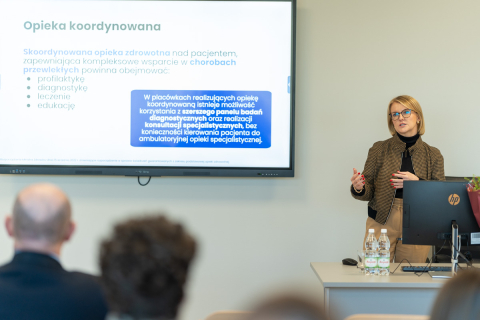The lecture focused on the goals and challenges of implementing coordinated care in our country.
What is coordinated care
Currently, the coordinated care includes services such as comprehensive advice (medical care plan), specialist consultations (5 fields), educational advice, diagnostic tests (extended), dietary consultations. The Primary Health Care (POZ) implementing coordinated care also has a coordinator - who is the “patient's guardian.” His tasks include making appointments with specialists (the patient does not have to find specialists on his own).
For now, coordinated care includes five pathways: cardiology, endocrinology, diabetes, allergology and nephrology. The Primary Health Care (POZ) can sign a contract for all of these pathways, or just one or more of them - depending on their capabilities.
What are the benefits of it
Two years have passed since the program was implemented. The speaker evaluated it positively. She stressed that coordinated care means providing the patient with a complete process of diagnosis and therapy for a chronic disease (covered by coordination). This happens within the scope described in the law, with the creation of an Individual Medical PLAN (IPOM).
The benefits of implementing coordinated care include a shift from “referral medicine” to comprehensive medicine, standardization of diagnostic and therapeutic procedures, as well as raising the prestige of family medicine as a medical specialty. And what do patients praise most? - Access to more tests and the care of a coordinator (thanks to him, they do not feel lost and left alone).
Currently, 38% of Primary Health Care providers are already implementing this model of care, and this percentage is steadily increasing.
After the lecture, Agnieszka Mastalerz-Migas, MD, PhD, answered questions about both the inclusion of more disease entities and preventive measures in this model of care. The speaker also encouraged students to take up specialization in family medicine in the future and to look at the problems of functioning of the health care system from different perspectives.
The lecture was attended by second- and third-year medical students, representatives of the dean's authorities of the Faculty of Medicine : Prof. Tadeusz Grochowiecki (Vice Dean), Prof. Renata Główczyńska (Vice Dean), and the representatives of the Faculty of Medicine and Dentistry: Joanna Peradzyńska, MD, PhD (Vice Dean), as well as Prof. Piotr Tyszko (Chairman of the Sanitary and Epidemiological Council at the Chief Sanitary Inspector), academic teachers.
The meeting was organized by the Department of Social Medicine and Public Health of the Faculty of Medicine MUW, headed by Prof. Aneta Nitsch-Osuch. The tradition of open lectures, inaugurating public health classes for medical students, dates back to 2016; previous guests included: Prof. Lidia Brydak (Head of the National Influenza Center), Izabela Kucharska, MD, PhD (deputy Chief Sanitary Inspector), Dr. Łukasz Jankowski (President of the Supreme Medical Chamber). The idea behind the meetings is to get students interested in public health issues and enable them to get to know significant figures in this field who have a real impact on shaping health policy at the national level.



